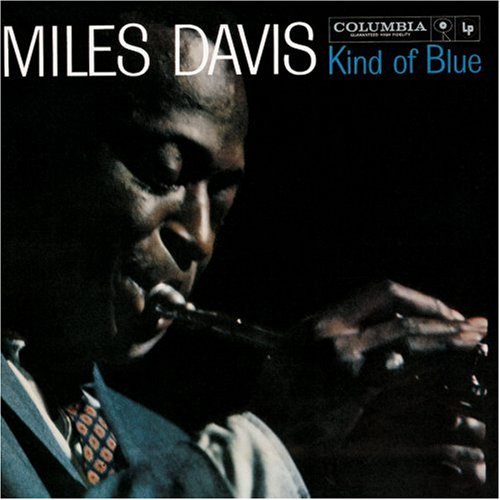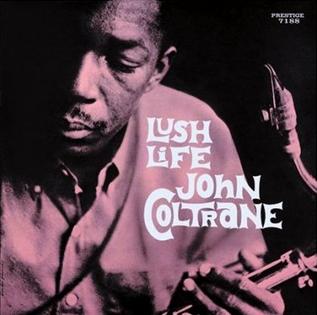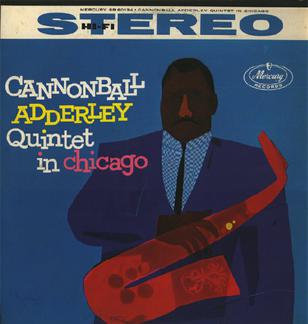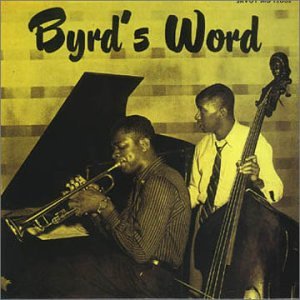Recent listening, current
Archived listening, 2013-2016
Showing posts with label paul chambers. Show all posts
Showing posts with label paul chambers. Show all posts
Monday, January 13, 2014
168. Miles Davis / Kind of Blue (1959)
A review of Kind of Blue seems pointless. I'll muse for a few hundred words, and then quit. I imagine a world without this record, and that is a difficult world. It's a world where Bill Evans didn't sub for Wynton Kelly, a world in which countless musicians were struck by inspiration elsewhere. A world that is one milestone short of properly demarcating the future. A world where your brain is not irresistibly and without permission drawn to referencing all subsequent Miles Davis dates to this one. It's a world without the myth of it all being done in one take, a world where you don't have to buy that other CD to find out that what you missed was not really anything special. In this world, 1959 is not terribly different than 1958 or 1960. The Columbia vault is one cart of tapes lighter. It's a party that went one album different. It's the late night DJ who selects something by Cliff Brown instead. It's a world where the porter didn't see the CD on my passenger seat. It's a world where as a teenager, I didn't once stop my bicycle in the middle of an intersection to change the batteries of my headset. It's a world where my daughter was lulled into dreamland by someone else's trumpet, and awakened by someone who was not John Coltrane. It's a lot the same, but it's not the same, and I'd rather have it with Kind of Blue.
Labels:
1959,
bill evans,
cannonball adderley,
columbia,
hard bop,
jimmy garrison,
john coltrane,
julian adderley,
kind of blue,
miles davis,
modal,
paul chambers,
post bop,
sextet,
trane,
trumpet,
wynton kelly
Monday, January 6, 2014
167. John Coltrane / Lush Life (1961)
While Prestige's Lush Life was not released until 1961, it was recorded by Van Gelder during three sessions in '57 and '58. As he was no longer recording for the label, Coltrane had no say in it but ironically, the record contains a few of his choicest recordings playing in the small group, hard bop setting. This was an incredibly fertile period for Coltrane. He had yet to compose the seminal works that later appeared on Blue Note and Atlantic but was already working on the technique and musical ideas that would define his legacy. The first three tracks present Coltrane as leader of a pianoless trio, fleshing out a lot of chords in lieu of the keyboard. The most memorable moment on Lush Life is probably the title track, a luscious ballad owned by the leader until around nine minutes in when Donald Byrd steps out of the woodwork for some equally inspiring lines on the trumpet. Two years ago I was at a stoplight listening to this on the radio and was so transfixed by Byrd's meandering melancholy that it took a horn blast from the car behind me to break the reverie. While I'll never recreate that moment, I can still listen again and again. "Trane's Slo Blues" is also notable for Coltrane's moves inside the changes. These tracks appear on the boxset Fearless Leader although they are not presented in the same sequence as they are here, which is actually quite good.
Labels:
1957,
1958,
1961,
albert heath,
art garland,
art taylor,
donald byrd,
earl may,
hard bop,
john coltrane,
louis hayes,
lush life,
paul chambers,
prestige,
quintet,
tenor,
tenor sax,
tenor saxophone,
trio,
trumpet
Tuesday, November 19, 2013
151. Hank Mobley / Workout (1961)
The band is Mobley with Wynton Kelly, Paul Chambers, and Philly Joe Jones playing typically of the period. I can't help but feel that Mobley is underrated as a composer and stylist, though. He's in that club with George Coleman and a few others, seemingly overshadowed by the giants they came up with. There's a lot of blues on this record, dotted here and there with elastic phrases and effervescent flurries by Mobley. Four of the six tunes are Mobley's originals, the exceptions being "The Best Things in Life are Free" and "Three Coins in the Fountain." They're interesting covers, one being rather old and the other an oddball. I like Mobley's melodic inventions and improvised embellishments of the melody. His colorful palette combined with a hard charging, muscular sound occasionally reminds me of Dexter Gordon. In the rhythm section, Jones and Chambers keep the soloists busy by mixing up the tempo, Jones occasionally very aggressive with crashes and rolls, playing melodically, not just rhythmically. Green and Kelly often solo in that order. Green has no trouble in the bebop idiom, spinning single-note solos like a bluesy sax. You can't go wrong with this or Another Workout, but for Mobley beginners, I'd start with Soul Station.
Friday, November 15, 2013
149. Cannonball Adderley Quintet in Chicago (1959)
Cannonball Adderley Quintet in Chicago (aka Cannonball & Coltrane on Limelight LS 86009) is a splendid disc from the core band that recorded Kind of Blue. "Limehouse Blues" stands ragtime roots on their head in the attitude of hard bop. A sparring match between alto and tenor proceeds at breathtaking pace until the tune reels in for a final, punctual tutti on the main theme. "Stars Fell on Alabama" is next and features very sensitive embellishments from Adderley. Kelly goes next, tinkling single notes into the dusty register. As saxes go, it's a pleasure to hear the two styles in opposition. Adderley and Coltrane ride atop the rhythmic swell and strike the bar at will. But the two players are not very similar. Contrast their rhythmic interpretations of "Wabash," or technique in "Grand Central," which crackles with Trane's rhythmic inventions in fast triplets. The ballad "You're a Weaver of Dreams" is handed to Coltrane, and Kelly strolls through some jaunty figures that recall the old school with aplomb. On each track, whether it's Adderley busting open the guts of the melody and improvising endlessly thoughtful variations on its theme, or Coltrane boldly probing the rhythmic and harmonic architecture, there's always something to hang an ear on. This disc is a fine compliment to Kind of Blue, Somethin' Else, and At Newport 1958.
Wednesday, November 6, 2013
146. Wes Montgomery / Smokin' at the Half Note (1965)
Smokin' is the second collaboration between Montgomery and the Wynton Kelly Trio. They played on a couple of his other albums, too, and they make a solid group. The trio is Kelly, Chambers and Cobb. Having said as much I shouldn't have to say more because the names, let alone the music, practically say it all. I'll listen to anything with these guys. Only two of the five tracks on the original LP are actually live from the venue, "If You Could See Mee Now" and "No Blues." The other three are from (where else?) Van Gelder's studio. It doesn't really matter because both dates are terrific. Our opener "No Blues" pushes 13 minutes in length, marked by Montgomery's fat tone and heavy right hand. It's also an interesting piece as far as Miles covers go, dating from his 'casting around' period before the second great quintet formed up. But getting back to Wes, his melodic constructions in "Unit Seven" are something to marvel at. It's refreshingly cogent jazz thinking, replete with strong musicality and inventive spirit. For both live and studio material, Chambers and Cobb are the bedrock while Kelly is probably the perfect pianist for this group, having both the technical facility and bluesy swagger necessary to enhance the brew. If you want to learn what jazz guitar is all about, this is a good entry point.
Labels:
1965,
blues,
guitar,
hard bop,
jazz,
jimmy cobb,
live,
paul chambers,
quartet,
review,
rhythm and blues,
smokin at the half note,
soul jazz,
wes montgomery,
wynton kelly,
wynton kelly trio
Thursday, October 3, 2013
142. Miles Davis / Miles Ahead (1957)
This album is the natural progression out of the Miles Davis Nonet style that was documented on The Complete Birth of the Cool. Davis and Evans deliver on the promise with a new band almost double in size. Davis is the only soloist, playing flugelhorn instead of trumpet. Evans is composer and arranger. The sound of the orchestra is lush and slick, clear evidence of the project's bigger budget. Evans' arrangements elegantly capitalize on the power of the massed pieces, and with Davis on the flugelhorn, there's a stately majesty at play. The playlist is arranged like one continuous performance (see Such Sweet Thunder by Duke Ellington). I love the way all the moods melt into one another, contrasting against a greater arc of musical story. The Spanish tinge of "Maids of Cadiz," for example, or the hard swinging "New Rhumba" (Ahmad Jamal) that explodes from "Blues for Pablo." It's magic, and essential listening for all jazz fans. No excuses!
Monday, August 5, 2013
121. Johnny Griffin, John Coltrane, Hank Mobley / A Blowin' Session (1957)
Blue Note's A Blowin' Session featuring Little Giant, Trane, Hank Mobley, Lee Morgan, Wynton Kelly, Paul Chambers, and Art Blakey sounds exactly as you'd think it would. It's technically a Griffin date, who is leader, composer, and one third of the groups's tenor sax nucleus. But Morgan gets plenty of time, and so do Kelly and Blakey, for that matter as if Blakey's hard to miss. The meeting was a pickup after the Chicago-based Griffin found himself in New York at the same time as the others. With so many good players, it's a jazz buffet. The septet shows its talent in tracks like "The Way You Look Tonight," or the swinging ensemble groove of "Ball Bearing." As two horns who played with Miles Davis so close together, listening to Trane in opposition to Mobley is interesting (see Prestige's Two Tenors or Tenor Conclave for more of Trane and Mobley together). Morgan's licks on "Smoke Stack" set the pace for the rest of the group, though Coltrane feels overburdened, it's still my favorite cut on the album. Thankfully, there is an alternate take on the Blue Note CD that offers him a second chance as well as a wild good performance from Griffin. Why they issued the original take instead of this one remains a mystery to me, unless for the outstanding work by Morgan. As a note, this album also marks th eonly ecorded meeting between Griffin and Coltrane.
Friday, May 24, 2013
105. Benny Golson / Groovin' with Golson (1959)
Golson only has a single composing credit on this album ("My Blues House"), which is too bad considering how much I enjoy his style of jazz. But that tune, a slow blues, is the very first one on Groovin'. It is adequately seasoned with Curtis Fuller's flashy statements on trombone, perhaps more than Golson himself. Things move to a mid tempo piece "Drum Boogie" that swings hard with Art Blakey at the helm, before cooling down with the Rodgers and Hart standard "I Didn't Know what Time it was." Golson's sax blends sweetly with Fuller's trombone, and both are accomplished soloists. It's nice to hear their tones in opposition, too, as in "The Stroller" where a caustic Golson veritably peels the paint off the walls before we hear Fuller's punchy but softer sounding approach with short, staccato phrases. There's some brilliant piano work by Ray Bryant, possibly overshadowed by Golson or Fuller but easily underrated. Chambers and Blakey get a turn before everyone does fours and the thing wraps up. The quiet "Yesterdays" finishes the album with a whisper. Groovin' was recorded immediately before the formation of the Jazztet, but it's easy to see where things were going. I think here, Blakey gives a hard edge that was missing from even the Jazztet's most brilliant moments.
Saturday, March 30, 2013
66. Miles Davis / At Newport 1958 (1958)
This live disc features the sextet that recorded Kind of Blue a short time later. It's also the debut of Cobb and Evans with the group. Davis premiered his new lineup in the context of Newport's considerable inertia. The gloves are off right from the start. "Ah Leu Cha" is the fastest I've heard it played by anyone and Adderley, Davis, and Coltrane show off their chops in blistering runs of mind boggling accuracy. If you haven't heard this, I advise you turn up the volume to fully appreciate these musicians when they start blowing. I think their power even surprised the leader. It's like going from 0 to 60 in an instant. Davis is in high spirits, talking all throughout the set, encouraging his musicians. Evans is careful when he slips between Adderley and Coltrane, but offers excellent harmonic advice and makes a few pointed statements as with "Straight No Chaser." It's easy to see why Davis picked him, and to hear him outside of his role in guiding the modalities heard in Kind of Blue is quite exciting. A short-lived and critically under-documented group, I'm thankful to have this disc.
Labels:
1958,
at newport 1958,
bill evans,
cannonball adderley,
columbia,
hard bop,
jazz,
jimmy cobb,
john coltrane,
julian adderley,
kind of blue,
live,
miles davis,
paul chambers,
review,
sextet
Friday, March 29, 2013
65. Clark Terry Quintet / Serenade to a Bus Seat (1957)
Whew! Nice rekkid. If you're wondering, the title is an homage to Terry's tenure in the Duke Ellington band. With Johnny Griffin on loan from Blue Note, a pre-flugelhorn Terry teamed up with Philly Joe, Paul Chambers, and Wynton Kelly to record this loosely swinging romp through the blues, bop, and ballads. It's quintessential hard bop, the kind of album your shelf should feel empty without -- for a comparison, this album feels very similar to Adderley's Somethin' Else, Davis' Steamin', or Sonny Clark's Cool Struttin'. Listen to Griffin and Terry trade fours on "Digits" and "Boardwalk," or the blizzard of unison playing in Charlie Parker's "Donna." There is a lot of familiarity between these musicians, especially the rhythm section which crystallized together under Miles Davis the previous year, and it comes through in the music. "Cruising" is a bluesy gem late on the second side, followed by a short but spicy "That Old Black Magic," which was given a shake of Latin rhythm for good measure. Terry also displays his prowess as composer on cuts like the beautiful the title track, "Boomerang," or "Boardwalk."
Thursday, February 28, 2013
46. Donald Byrd / Byrd's Word (1955)
It was announced that Mr. Byrd passed away early this month. Before his role in jazz education and outreach, Byrd was a noted session leader and prolific collaborator. Byrd's Word (not to be confused with Charlie Byrd's Byrd's Word! from 1958) is an early disc of his that was recorded for Savoy in 1955 and shows his original, pre-funk style on the open trumpet. When a guy has a good tone, I love to hear him use it. That's the case here, although his licks are understated compared to his pyrotechnics on other people's dates, like Coltrane's exemplary "Lush Life." Chambers plays bass, Basie alum Frank Foster and the versatile Hank Jones do tenor and piano, with Kenny Clarke on drums. Byrd's "Gotcha Goin' n' Comin'" is a bluesy exercise in mood and rhythm that seems to be as much about Clarke and Chambers, as it is about Byrd. There's a lot of space in the middle and it's heavy on the atmosphere. But once it whispers goodbye, the followup is the jolting "Long Green" that sounds straight off one of the Charlie Parker Savoys. Foster is a versatile player who can play bop as well as he can do hard swing or ballads. There's room for everyone, before the album closes with "Star Eyes" and the beautiful "Someone to Watch Over Me." The latter is my favorite cut on the album, but it works only if I listen to the whole album first. It's a fitting closer to the preceding program, featuring a sentimental intro from Byrd, a moving legato chorus from Foster and one from Chambers, then the go-lightly contributions of Jones and all, who carry it out and are careful not to break the magic. Overall it's a very loose hard bop session that's probably easy to forget and may be similar to other groups, but is superbly rendered.
Friday, February 1, 2013
22. Sonny Rollins / Tenor Madness (1956)
It's great to hear Coltrane and Sonny Rollins working alongside one another. At the time of this recording, both players were up and coming, on the brink of changing jazz as we hear it today. On the title track "Tenor Madness," everyone is eager and gregarious. Coltrane goes first, offering a bright, slippery tone with more focused objectives. Sonny is next, spreading it around more with a deeper, wetter tone. The playing from both men is anything but a cutting contest. In fact, they sound relaxed and patient, as if casually trying out new ideas without worrying about the overhead. It's a quality session with some historic import, and an interesting footnote to fans of Miles or Monk, for obvious reasons. Tenor Madness is also interesting in that it contains Miles Davis' working group, but proceeds without his direction. In that regard, the product comes off as far less focused and lacking the inertia of Workin', Steamin' or Relaxin'.
Wednesday, January 30, 2013
20. Miles Davis / The New Miles Davis Quintet (1956)
The maiden voyage on wax by the famous first quintet is short, sweet, and relaxed. It's still a young group as far as studio work was concerned so the set is fairly vanilla but hides a few gems, like Benny Golson's "Stablemates" and "The Theme," which is probably the hottest take on the disc. The performances hardly hint at what the band was capable of in a live setting, but Miles solos frequently and I really enjoy his thoughtful way with phrasing the ballads. Coltrane was still fishing for his voice and sounds a mite green compared to a few years later, but you can hear the pieces he's setting up. Another highlight is the opener, Ellington's "Just Squeeze Me." It has Chambers walking some coy figures on the bass while Philly Joe is keen to join the fun with the kick and snare, also playing some cool syncopated figures on the hi-hat. Overall, it's a smooth but enjoyable cruise and is sometimes so restrained that the rhythm section stands out more than the front line.
Sunday, January 27, 2013
17. John Coltrane / Soultrane (1958)
Coltrane's Prestige releases get overlooked unfairly, usually by the same people who prefer his innovative compositions or wilder explorations like those on Blue Train or Giant Steps. But if someone who honestly enjoys jazz can still relegate Soultrane to the sideline after hearing the unbridled modality of "Russian Lullaby" or 10+ minutes of pure soul in Eckstine's "I Want to Talk About You," then maybe that person would be better served by another type of music. The music on Soultrane is stunning, and a great starting point to understand modal soloing in jazz, a ferocious technique that Ira Gitler described as "sheets of sound." Garland, Chambers and Taylor back up Coltrane heroically and have a keen sixth sense for what he is doing. The set is comprised of covers, including a few cooky ones like the aforementioned "Russian Lullaby" or Broadway's "You Say You Care." These bring a strong, focused urgency to the program, a quality that is always present in Coltrane's work but is laid plain in the standards.
Saturday, January 26, 2013
15. Nat Adderley / Introducing Nat Adderley (1955)
It was released under Nat's name but the Brothers Adderley really split the bill here, including most of the composition credits. It's solid hard bop and sounds a lot like what other New York groups were doing in 1955, but this beautiful example has aged very well. The other three comprising the quintet are Horace Silver, Paul Chambers, and Roy Haynes. Together, they make one of those 'perfect' jazz groups like the classic Coltrane quartet or first Miles Davis quintet. Nat's trumpet work is fresh, brassy and forthright, Cannonball is his usual slippery and blues inflected self, using a combination of Birdlike runs in the higher register with. In fact, both brothers play with a satisfying helping of blues and soul. I listen to the accomplished playing on this disc, tracks like the autobiographical "Two Brothers" or "New Arrivals," or the ballad "I Should Care," and it's easy to see how New York's band leaders and other players took so quickly to the Adderleys right when they arrived, moves which put them on the map for the recording labels.
Labels:
1955,
alto saxophone,
ballad,
cannonball adderley,
cornet,
hard bop,
horace silver,
introducing nat adderley,
jazz,
julian adderley,
nat adderley,
paul chambers,
roy haynes,
trumpet,
wing
Thursday, January 24, 2013
13. Hank Mobley / Soul Station (1960)
The title Soul Station sounds like something out of the Jimmy Smith catalog, doesn't it? But it isn't soul jazz. Hank Mobley did not lead his own group often, and this statement of purpose really pops him out. Art Blakey, known to go full bore with the hard sticks, is more restrained and along with Chambers, carries a very laid back but swinging groove for Mobley to steer from the top. Wynton Kelly spreads out behind Mobley, playing a lush accompaniment of chords and his own bluesy licks. Mobley's technique is at the fore of the group, subtly kneading and stretching the signatures like dough. "Spirit Feelin's" has some good playing from everyone, including a short but terrific solo from Blakey. It is followed by the title track, a smoking slow blues jam that reminds me a little bit of Johnny Griffin's "Satin Wrap." But Mobley's patient phrasing and rhythmical construction are wholly different from Griffin's. The album closes with "If I Should Lose You," a standard that is treated similarly to the opener.
Subscribe to:
Posts (Atom)














